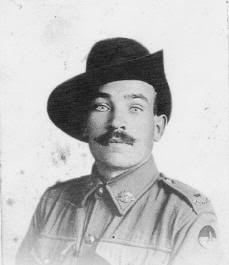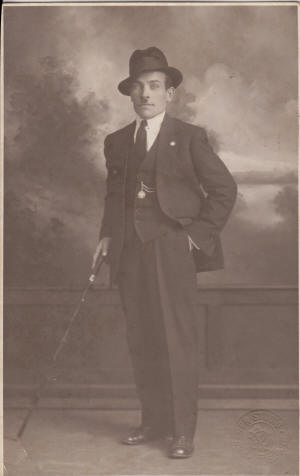Justin Glowacki
| Alias | Usten (Uesten) Glavasky (WWI service records) |
|---|---|
| Russian spelling | Устин Романович Гловацкий (Главацкий) |
| Born | 15.08.1888 |
| Place | Zhabinka, Brest, Belarus |
| Ethnic origin | Belarusian |
| Religion | Russian Orthodox |
| Father | Roman Glowacki |
| Mother | Tatiana Glowacki (née Sladziev) |
| Family | wife Stefania Glowacki, daughters Olga b. 1933, Teresa b. 1932, both born in Warsaw, daughter Barbara b. 1946 in Sydney |
| Residence before arrival at Australia | Served in 4th Siberian Infantry, 1909 to 1912 |
| Arrived at Australia |
from Far East on 23.05.1913 per Inaba Maru disembarked at Brisbane |
| Residence before enlistment | Rockhampton, Qld |
| Occupation | 1915 cook, 1918 steward, railway lengthsman, 1919-20 cook, 1921 gardener, 1930s caretaker, since 1938 ship's steward |
| Naturalisation | 1940 |
| Residence after the war | 1918 Brisbane, 1919 Coolangatta, Brisbane, 1923-25 working as steward on ships visiting Honolulu; 1927-1930 Paris, 1930-1936 Warsaw, 1936-1938 London, 1938-1940 Australia, served as merchant seaman in the British Navy at WWII, after the war lived with family in Sydney |
| Died | 5.11.1964 Sydney |
Service #1
| Service number | 2143 |
|---|---|
| Enlisted | 1.04.1915 |
| Place of enlistment | Rockhampton, Qld |
| Unit | 9th Battalion; 49th Battalion |
| Rank | Private |
| Place | Gallipoli, 1915; Western Front, 1916-1918 |
| Final fate | RTA 23.09.1918 |
| Discharged | 12.12.1918 |
Materials
Naturalisation (NAA)
Digitised Embarkation roll entry (AWM) (Glavasky)
Naturalisation certificate (NAA)
Digitised service records (NAA) (Glavasky)
Alien registration (NAA) (Glavasky)
Application for Campaign Stars and War Medal (NAA)
Digitised application for permit to enter Australia 1
2 (NAA)
Digitised personal statement and declaration by alien passenger (NAA)
Glowacka, O [Olga] - naturalisation (NAA)
Glowacka, T [Teresa] - naturalisation (NAA)
RUSSIAN ANZAC, Justin Glowacki, a collection of ephemera (description of auction lot)
Publications
Елена Говор, Белорусские Анзаки, Białoruskie Zeszyty Historyczne, 2013, no. 40, c. 53-108. То же: Белорусские Анзаки, Неман, 2017, № 4, с. 152-167, № 5, с. 156-173.
Graham Wilson, Dust Donkeys and Delusions: The Myth of Simpson and His Donkey Exposed, Newport, NSW : Big Sky Publishing, 2012, pp. 243-244.
Blog article
From Russian Anzacs in Australian History:
'One day, when we were sitting around the table having hot potatoes in winter', Justin Glowacki's daughter Barbara remembers, 'I said, "I've just been at school and we spent the whole lesson talking about that fantastic man called Simpson." And my father absolutely saw red and started screaming, "That idiot! He killed more people with his stupid behaviour than he saved. He'd be carrying a stretcher and the next minute he'd be doing funny shapes to the Turks, saying, Here I am, jumping up and down, and the wounded person'd get shot." And he said, "How many donkeys and wounded people got killed because of his stupidity!" He used to say that he had bellyaches so he would not have to work with Simpson, because going out with him was very dangerous.'
Justin Glowacki's own life-story was full of adventures. He was the great-grandson, if the family tale can be believed, of a rich landlord, who frequented the czar's palaces. Justin started his career in the Australian army as a cook but, on the ship over to Egypt, 'He was changed from a cook to a batman', as Barbara tells it, 'he looked after officers, because they realised that he was a gentleman, he knew a lot about cultured things. ... When he was disembarked at Gallipoli, they assigned him to a stretcher-bearing unit, because they were looking for short men.' He was a stretcher-bearer there but it couldn't have been with Simpson since Glowacki disembarked at Gallipoli on 2 September 1915 and Simpson had been shot almost four months earlier, on 19 May. Well, there might have been other Simpsons along his way ...
Glowacki had an encounter at Gallipoli which would prove useful later in his life -- 'he helped a man survive, by going and picking him up, and carrying him all the way back across the beach to the boats which were taking the wounded back to the troop-ships. It was Frank Savary's cousin or family member whom he actually saved. And the fellow asked his name, he had been an officer. He remembered him', Barbara relates, 'and so after the war Frank Savary would do anything my father asked.' Years later Frank Savary would rescue Justin's family trapped in Poland during the Second World War [...]
Gallery

Justin Glowacki
Courtesy of Barbara Jago

Justin Glowacki, Brisbane, 1921
Courtesy of Osiph Rinkevich's family
 Russian Anzacs
Russian Anzacs